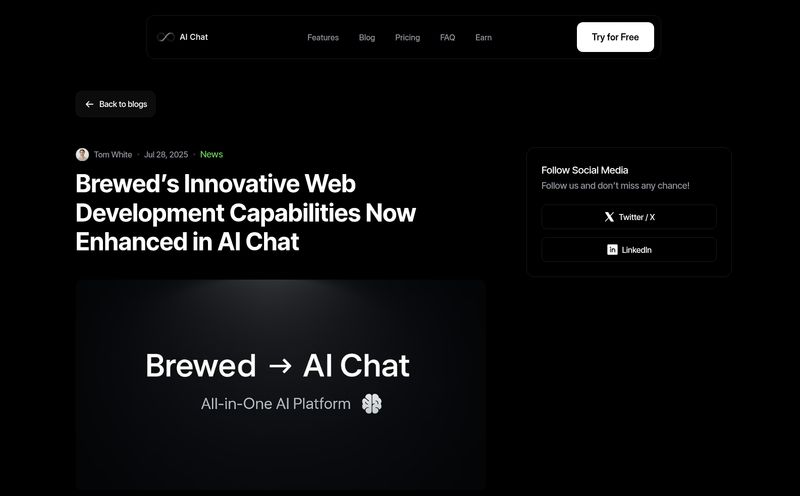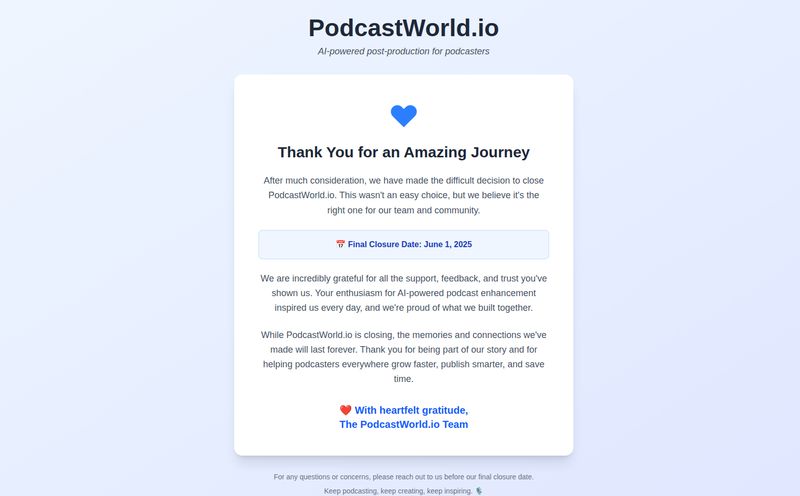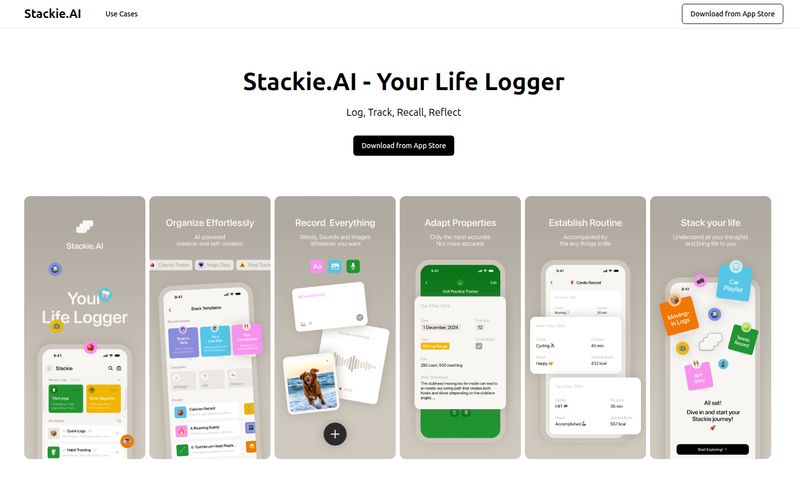As someone who lives and breathes SEO, I spend an ungodly amount of time staring at Search Engine Results Pages (SERPs). I’ve seen it all: the good, the bad, and the truly spammy. So when a tool comes along promising to cut through the noise—and not just any noise, but the noise of an entire foreign language internet—my ears perk up. The tool in question is a Chrome extension called simply, AI Search.
The promise is huge. Imagine being able to research a topic and pull insights from Japanese blogs, German forums, and Spanish news sites, all without ever leaving your native tongue. It sounds like something out of science fiction. It’s like having a UN translator and a research assistant rolled into one, living right in your browser bar. But as we all know, in the world of tech, big promises can sometimes lead to big disappointments. So, I took it for a spin.
What is This AI Search Thing, Anyway?
At its heart, AI Search is a free Chrome extension designed to do one thing really well: let you search the web in your language, find content in other languages, and get a summary of that content back in your language. Simple, right?
It’s built on what’s called RAG technology (we’ll get into that a bit more later, I promise it's interesting). The developers also make a bold claim right on their store page: it “down-ranks results containing ads or originating from content-farms (‘SEO Junk’).” As an SEO pro, that’s a statement that gets my attention. Are they taking a shot at my profession? Maybe. But I’m more interested in whether it actually works.
Getting Started is Almost Too Easy
There's no complex setup here. You head to the Chrome Web Store, hit ‘Add to Chrome,’ and you’re pretty much done. To use it, you just pop open a new tab, type the trigger word “ai” into your address bar, followed by whatever you want to search for. For instance: ai latest breakthroughs in solar panel efficiency in Germany.
Instead of getting the usual Google page, you're redirected to the AI Search interface, which goes to work, scouring the web and preparing a summarized answer. You can even customize the trigger word if “ai” isn’t your cup of tea. It’s a pretty slick implementation that doesn’t get in your way.

Visit AI Search
Putting AI Search to the Test
Theory is great, but I wanted to see how it handled a real-world task. I've been following the burgeoning e-bike market in Europe, specifically some of the component manufacturing trends in the Netherlands. Normally, this would involve a lot of Google Translate, awkward phrasing, and trying to decipher if “componenten” means the same thing in every context. It's a slog.
The Good Stuff: Crossing the Language Divide
I typed in ai new e-bike battery technology from Dutch companies and waited. A few moments later, it came back with a synthesized summary. It pulled information from a couple of Dutch tech news sites and a business forum I would have never found on my own. It mentioned a company called “Eleo” and their work on battery modules, a detail I had missed in my English-only searches. This was it. The magic moment. It wasn't just translating; it was discovering and summarizing. It saved me what could have easily been an hour of frustrating, tab-heavy research.
A Few Bumps in the Road
Now, let's be real. The tool has, at the time of writing, a 2.5-star rating on the Chrome store. And you don’t get a rating like that if everything is perfect. The primary drawback is one inherent to AI right now: nuance. AI translation is miles ahead of where it was five years ago, but it’s still not human. It can miss sarcasm, cultural context, or the subtle implications between the lines. The summaries are fantastic for getting the gist of an article—the who, what, where—but you might lose the why or the how it felt. It’s a tool for reconnaissance, not for deep literary analysis. If you need a word-for-word, legally-binding translation, you still need a professional human translator. For initial research, though? It’s a heck of a shortcut.
Who Is This Tool Really For?
After playing around with it for a while, a clear picture of the ideal user started to form in my mind. This tool is a potential game-changer for:
- Students and Academics: Tapping into international research papers and studies without being a polyglot.
- Market Researchers & Strategists: Keeping a pulse on global trends, competitor movements, and consumer chatter in different regions.
- Journalists: Finding primary sources and story leads from local news outlets around the world.
- The Endlessly Curious: Anyone who has ever wondered, “What are people saying about this movie in Italy?” or “What’s the top recipe for pão de queijo on Brazilian websites?”
It’s for anyone whose curiosity is bigger than their language skills. Which, for most of us, is a pretty wide field.
Let's Talk About RAG (Without The Headache)
I mentioned the term RAG earlier. It stands for Retrieval-Augmented Generation, and it’s actually what makes tools like this so much more useful than a standard chatbot. Think of it like this: A normal Large Language Model (like a basic ChatGPT) is like a student answering questions from memory in a closed-book exam. They know a lot, but it's all based on what they studied (were trained on) up to a certain point.
RAG is an open-book exam. When you give it a query, it first goes out and retrieves fresh, relevant information from a source (in this case, the live internet). Then, it uses that newly found info to augment its response. This means the answers are more current, more accurate, and grounded in real data, not just reciting old training material. It’s why AI Search can tell you about something that happened yesterday on a German news site. It’s a smarter way to AI.
The Elephant in the Room: The Anti-SEO Claim
Okay, let’s get to the juicy part. The claim that it down-ranks “SEO Junk.” I have… feelings about this. On one hand, I get it. We’ve all landed on those terrible content-farm pages that are 90% ads and 10% fluff, written just to rank for a keyword. It's the bane of our existence. In my tests, AI Search did a decent job of avoiding these thin, ad-plastered pages and seemed to favor news outlets, forums, and more direct sources.
However, calling all “Search-Engine-Optimised sites” junk is throwing the baby out with the bathwater. Good SEO is about making content accessible, user-friendly, and easy for search engines to understand. It’s about creating the best possible answer for a person’s query. What this tool really seems to be fighting is not SEO, but low-quality, ad-heavy, clickbait content. And I’m 100% on board with that mission. The phrasing is a bit aggressive, but the spirit is in the right place.
What's the Price for All This Magic?
This is often the sticking point, isn't it? Well, for now, there isn't one. The AI Search extension is currently free to add and use from the Chrome Web Store. There’s no pricing page or subscription model mentioned, which makes it a complete no-brainer to at least try. Will that change in the future? Who knows. But for now, it's a powerful tool without a price tag.
So, Is AI Search Worth a Spot on Your Browser?
After spending some quality time with it, my answer is a resounding… maybe. And that’s a good thing!
If you're looking for a perfect, flawless translator, this ain’t it. But that’s not what it’s trying to be. If you’re a researcher, a marketer, a student, or just a deeply curious person who feels hemmed in by the English-speaking internet, this tool is absolutely worth a try. It’s a window-opener. It tears down a few bricks from the language barrier wall, letting you peek at what’s on the other side. The ability to get the gist of foreign-language content in seconds is a genuine superpower for information gathering.
Yes, it has its rough edges. Yes, the low rating points to some valid user frustrations with accuracy. But for the grand price of zero dollars, it offers a glimpse into a more connected and accessible web. And I think that's pretty darn cool.
Frequently Asked Questions
- What is AI Search?
- AI Search is a free Chrome browser extension that allows you to search for content in foreign languages using your native language. It then uses AI to provide a summary of the findings in your language.
- Is AI Search free to use?
- Yes, as of now, the AI Search extension is completely free to install and use from the Chrome Web Store.
- How accurate are the translations and summaries?
- The accuracy is generally good for understanding the main points of a topic, but it's not perfect. AI can sometimes miss subtle nuances, humor, or cultural context. It’s best used for initial research rather than precise, official translations.
- What is RAG technology?
- RAG stands for Retrieval-Augmented Generation. It's an AI technique where the system first retrieves current, relevant information from a data source (like the internet) before generating an answer. This makes its responses more timely and fact-based.
- Does AI Search work on all websites?
- AI Search doesn't work 'on' a website directly. It performs a web search based on your query, scans multiple foreign-language websites in its results, and then creates a summary for you from those sources.
- Is my data safe with the AI Search extension?
- According to the developer's privacy policy on the Chrome Web Store, the extension does not collect or use your data. It also states that your data is not sold to third parties or used for purposes unrelated to the extension's core functionality.



